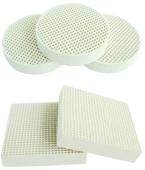| Ceramic Filters |

Skyline Components, LLC
Ceramic Foam Filter
Ceramic foam filters have a foam-like porous structure. They are
made of refractory materials that are resistant to molten metal
erosion. They are mainly used in the field of metallurgy and
casting metal liquid filtration and purification to remove
undesirable nonmetallic inclusions and reduce trapped gas that
are contained in the casting. There are three ceramic foam
filters, alumina, silicon carbide (SiC) and zirconia foam filters.
They can be supplied in round, square, rectangular or other
customized shapes with different pore sizes and porosities.
Extruded Ceramic Filter
Extruded ceramic filter has straight channels in honeycomb
structure. It is mainly used in metallurgy and foundry industry to
filter out impurities, reduce casting porosity, eliminate turbulence
in the metal stream and improve casting quality.
Characteristics
o Light weight
o Large surface area through-hole rate
o high pass rate
o Good chemical stability and corrosion resistance
o High mechanical strength
o High thermal shock resistance
Specifications
Ceramic foam filters have a foam-like porous structure. They are
made of refractory materials that are resistant to molten metal
erosion. They are mainly used in the field of metallurgy and
casting metal liquid filtration and purification to remove
undesirable nonmetallic inclusions and reduce trapped gas that
are contained in the casting. There are three ceramic foam
filters, alumina, silicon carbide (SiC) and zirconia foam filters.
They can be supplied in round, square, rectangular or other
customized shapes with different pore sizes and porosities.
Extruded Ceramic Filter
Extruded ceramic filter has straight channels in honeycomb
structure. It is mainly used in metallurgy and foundry industry to
filter out impurities, reduce casting porosity, eliminate turbulence
in the metal stream and improve casting quality.
Characteristics
o Light weight
o Large surface area through-hole rate
o high pass rate
o Good chemical stability and corrosion resistance
o High mechanical strength
o High thermal shock resistance
Specifications




| ||||||||||||||||||||||||||||||||||||||||||||||||||||||||||||||||||||||||||||||||||||||||||||||||||
|